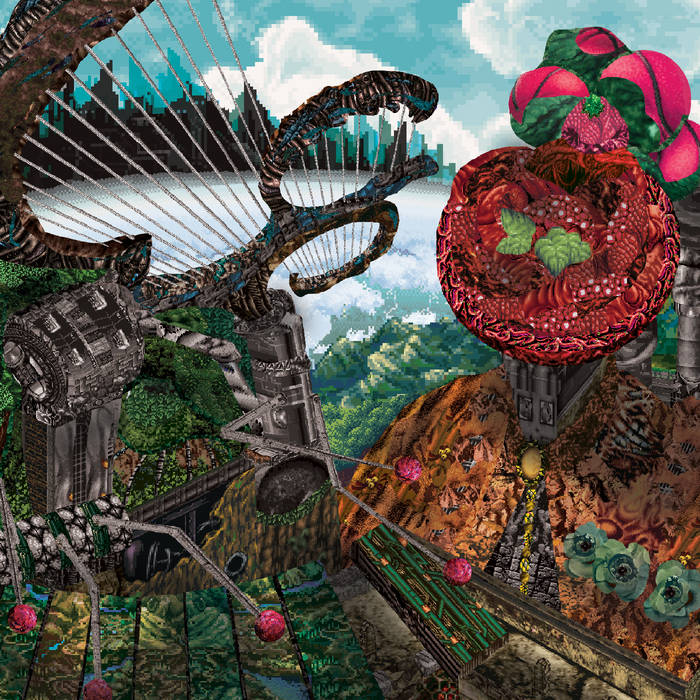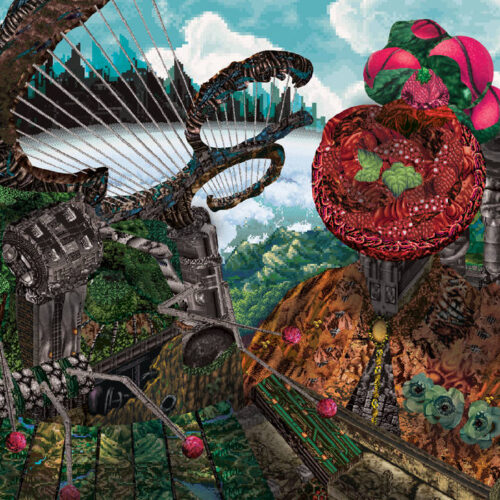While epithets like “transporting” and “evocative” tend to be overused to death, every once in a while something as expressive as d’Eon’s Leviathan will come around, truly deserving of them all. Free of the burdens of conceptual frames of reference or explicitly expressed cultural contexts, the Montreal based composer’s latest album appears as a series of seemingly uncomplicated but densely layered and vivid microcosms. He brings them into existence on the strengths of musical substance alone, fashioning gorgeous digital chamber pieces midway between Baroque fugues, Japanese RPG video game soundtracks, and the left-field of MIDI-fuelled contemporary electronic music.
d’Eon’s works from the late 2000s to the mid 2010s on the now defunct label Hippos In Tanks brought him in the same orbit as the oblique, reference-heavy avant pop and electronics of Hype Williams’s Dean Blunt and Inga Copeland, Arca, and James Ferraro. Still, his connection to peers seemed somewhat incidental. Even during his edgier years, his music searched for earnest, more human than human expressions, unlike most everything else found in the post-ironic landscape of the period – as Jordan Redmond presciently notes in his Tiny Mix Tapes review of 2012’s LP. Thanks to these circumstances, d’Eon’s inquisitive, uncertain side of the infamous 2011 split with Grimes Darkbloom was, quite expectedly, misunderstood at the time.
Leviathan is the logical next step in the evolution of the compositional approach d’Eon embarked upon with 2021’s Rhododendron, leaving behind the spiritual framing of his previous works for a purely musical experience. Aside from Max Allison’s customarily dazzling album art and the occasionally suggestive track titles – stage directions and indications of mood rather than narrative devices – the album’s world is built entirely by music.
Pieces such as the mesmerising ‘Rhododendron Pt. IV’ sound like cyclical themes imagined for bucolic scenes taking place between battles in a JRPG soundtracked by Yasunori Mitsuda, with synthetic dulcimers and dense woodwinds descending in breezy waterfalls over surging rompler effects. Meanwhile, ‘Heat Wave’ conjures 1970s tinged, faux-funk sexiness and ‘Climbing The Overhang’ gets imbued with an extract of smooth jazz fusion complete with sinuous bass lines in the vein of Angel Marcloid, who also mastered the album.
Throughout, d’Eon’s melodies are stunningly sentimental. Punctuated by guitar arpeggios and sharply plucked strings, harmonies and rhythms build up tension in lush orchestral arrangements then release it in spiralling ostinato phrases. The selection of tones and timbres remains equally important as the progressions they form across the pieces, enabling lavish themes to resurface with simple costume changes in cameo roles elsewhere on the album.
Those who have grown up in the 1990s surrounded by the same cultural zeitgeist as d’Eon might detect a faint hint of nostalgia in Leviathan. But similar to the appearance of motifs reminiscent of Johann Sebastian Bach’s or George Frideric Handel’s harpsichord concertos and suites, all influences are masterfully referenced, subverted, and fused with contemporary production techniques, as if intentionally placing the music outside of time rather than making it anachronistic. ‘The President Has Been Shot’ and ‘Waiting Room’ are particularly effective in this sense: the former’s stabbing, nervous cadence resembles a deconstructed IDM piece gliding along a folksy melody, while phase-shifted, lovely concertina licks and stuttering percussion uncover a pastoral atmosphere on the latter.
The frolicking clusters of piano chords that tumble down the closer ‘Leviathan’ at hazardously high speeds – sweeping up the vague Middle Eastern modes of ‘Installation of the Cisterns’ – are the final appearance of a series of electrifying twists and turns that d’Eon sprinkles over the album. These moments are so immersive, so tangible that they’ll make you wish you could live in them forever.



